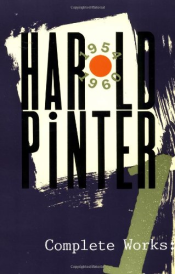THE STORIES: THE ROOM. While her taciturn husband remains engrossed in his magazine, Rose bustles about getting breakfast. As she works she carries on a monologue touching on the weather, the coziness of their cramped quarters, and the mysterious tenant who occupies a damp, windowless room in the basement. The aged landlord, Mr. Kidd, enters, and while he at least responds to Rose's small talk, he does little to allay her nameless fears of the room below. After Mr. Kidd and Bert, the husband, depart, a young couple appears in search of lodgings and Rose discovers that they had wandered into the basement room while looking for the landlord. Their description of what they saw, or rather felt in the darkness only heightens her growing sense of apprehension. Then, after they have gone, Mr. Kidd returns to tell Rose that she must see the man who has been waiting for her below, waiting for Bert to be gone. The stranger, when Mr. Kidd brings him in, proves to be a blind black man with a message for Rose, and while she disclaims any knowledge of who he is, the message, which is that her father wants her to come home, has an obvious and moving effect on her. As she reaches out to touch the blind man, Bert reenters and, while ignoring the stranger, speaks of the terrible weather through which he has had to drive his lorry. Then, after a long moment of silent study, he tips the blind man off his chair, knocks him down when he tries to rise, and kicks his head against the gas stove until he moves no more. There is a moment of silence, and then Rose clutches at her eyes and cries out. Now it is she who has become blind. (4 men, 2 women.)
THE DUMB WAITER. As the New York World-Telegram & Sun describes: "In the basement of a long-abandoned restaurant, two hired killers nervously await their next assignment. Barred from daylight and living public contact by the nature of their work, they expend their waiting time in bickering. So eerie is the situation that everything becomes comic, or grotesque, or both. Ben rereading a newspaper and exclaiming in disbelief over the news items, Gus fussing with an offstage stove and offstage plumbing. Ben bludgeoning Gus into silence if he as much as mentions their work. Gus worrying that someone had slept in his bed. So then the ancient dumbwaiter comes to life, the suspense becomes almost unbearable—that expertly has Pinter put the nerves of his characters and audience on edge." (2 men.)
A SLIGHT ACHE. Flora and Edward sit at the breakfast table chatting of flowers and wasps and of the slight ache Edward feels in his eyes. Their conversation, which seems so simple and is yet so strangely revealing, then shifts to the mysterious matchseller who has been standing by their back gate for many weeks. Somehow his presence intimidates them, particularly Edward, whose ache becomes aggravated as they discuss who the matchseller may really be, and they resolve to call him in for a direct confrontation. Flora goes out to invite him to come into the house, and when he appears he proves to be an old man, dressed in rags, and so feeble that it is doubtful whether he can see or hear. Seating him in a chair Edward speaks to him in an unnaturally jovial and somehow terrifying manner and soon Edward, without a word of reply from the matchseller, is so unstrung that he cannot go on. Flora takes over the interrogation, and again the old man's silence spurs the spilling out of buried frustrations and fears. Edward returns, and this time there is a note of desperation in his attempts to break through and understand the meaning of the matchseller. But it is Flora who leads the old man off at last, as a young girl might take her lover to the garden. As she goes she hands his tray of matches to Edward. He has lost the struggle, the nameless competition in which he has been engaged, and now it is he who has become the matchseller. (2 men, 1 woman, 1 man is nonspeaking.)
A NIGHT OUT. Living at home with his widowed, domineering mother, Albert is a meek, hen-pecked fellow for whom the invitation to an office party is a rare and welcome chance for a bit of fun. With his mother's exhortations to behave himself ringing in his ears (and his dinner in the oven lest he lose his nerve and turn back home), Albert meets his friends and goes off to the party. Once there, he struggles to overcome his shyness and join in the small talk, but when he is falsely accused of pinching a girl the resulting furor is more than he can cope with. Slinking home he is confronted with maternal diatribe which is, for poor Albert, the last straw. In a rage he rushes back into the London night and, picking up a girl at a coffee stand, goes with her to her room. But when they are alone the girl rambles on incessantly about what a lady she really is and Albert, perhaps sensing in her the personification of all the prattling women in the world, turns on her vindictively and annihilates her seamy and pathetic pretensions. Then he goes home again but when he does so there is a difference in him, a difference sensed by his mother—who now fears where once she was feared. (10 men, 5 women.) (This volume also includes
The Birthday Party and two short stories,
The Black and White and "The Examination.")
